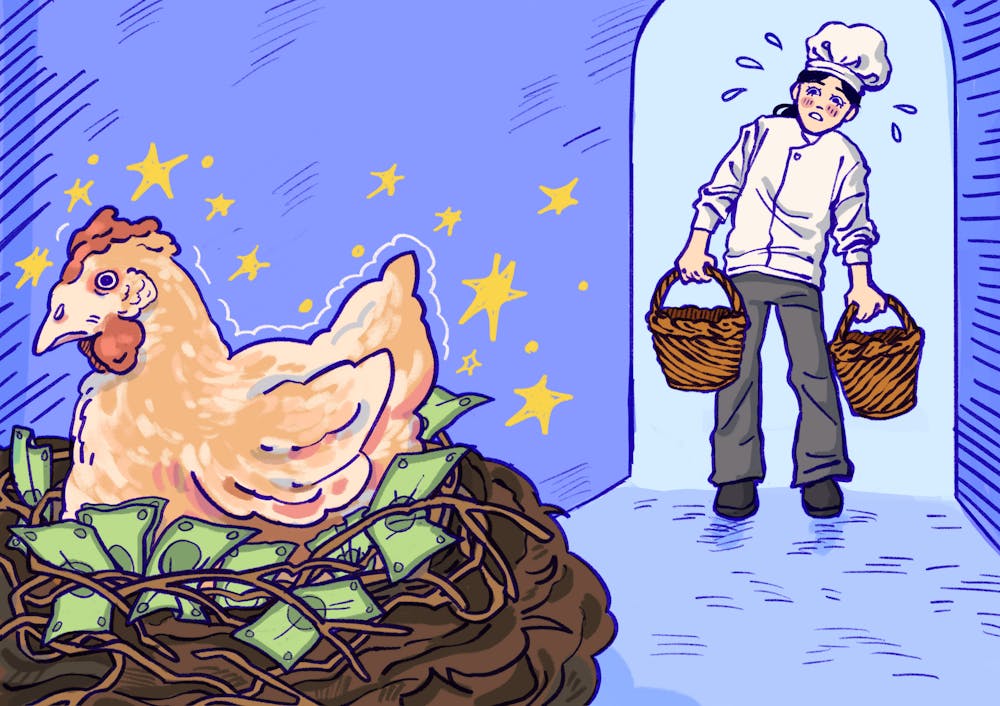At Cracked, a Thayer Street restaurant specializing in egg sandwiches, dozens of egg cartons line a shelf above the store counter’s buffet line. Customers often look at the array and comment “‘wow, that’s a lot of money right there,’” said Howard Pantz, one of the shop’s owners.
Since its opening last November, the price of eggs has skyrocketed.
The inflated prices come amid a nationwide shortage of eggs caused by a national outbreak of highly pathogenic avian influenza, commonly known as bird flu. The bird flu has killed more than 30 million birds this year, according to the March 7 U.S. Department of Agriculture’s Egg Markets Overview.
We “held on as long as we could before tweaking prices,” Howard Pantz, one of Cracked owners, told The Herald. The menu has seen an increase of about 50 cents per egg sandwich.
But Cracked is not the only Providence egg establishment that has been hit hard by rising prices. Many have been forced to raise prices and adjust their offerings, and some consumers report shifting their purchasing and eating habits in response.
Guillermina Perez, the manager of Bagel Gourmet’s Meeting Street location, first noticed the shortage around the end of January, she said in an interview with The Herald. The interview was conducted entirely in Spanish and translated by The Herald.
Bagel Gourmet recently added a 50-cent surcharge to all products containing eggs, including their breakfast sandwiches and burritos.
Since then, what Bagel Gourmet pays for a shipment of 180 eggs has doubled, from $60 to $120, Perez added. She said that the establishment has also encountered supplier-imposed limits to the number of eggs they can buy at once.
Though the 50-cent surcharge has helped Bagel Gourmet counter the higher cost of eggs, Perez thinks it has also driven down demand. Selling egg products are key to Bagel Gourmet’s business, and Perez expressed concern that ongoing supply and price issues could threaten the College Hill staple in the long term.
Retailers and grocery shoppers alike have been hit hard by the egg shortage. Claire Erlandson, a student at Johnson and Wales University who frequents Trader Joe’s, noticed that eggs have been scarcer and more expensive, a trend they say started last month.
Before the most recent spike in bird flu, Erlandson made omelets for breakfast and used eggs in her baking. Now, she has limited her egg purchasing to one carton every two weeks and started relying on other protein sources.
With prices at Whole Foods and Good Fortune approaching anywhere from $6 to $10, Erlandson was “shocked” to find a dozen eggs at Trader Joe’s for less than $4. But while Trader Joe’s has managed to keep its prices low, they have struggled to supply enough eggs to last until closing.
To adapt to plummeting supply, the store implemented a policy limiting egg purchases to one dozen per customer per day. The policy went into effect nationwide in early February, according to Nakia Rohde, public relations manager for Trader Joe’s.
Cracked has been shielded from the supply issues that have plagued Trader Joe’s and Bagel Gourmet. The restaurant is exclusively supplied by Stamp Egg Farms in Johnston. Stamp Egg has not lost birds to the bird flu so far, according to Brijette Stamp, a family representative of Stamp Egg Farms.
Stamp Egg Farms has noticed a positive shift in demand over the last few months, “particularly as more customers have been looking for reliable, locally sourced eggs,” Stamp wrote in a message to The Herald. “While prices have increased industry-wide due to avian-related shortages, we’ve worked hard to keep ours as stable as possible.”
Because of the national shortage, eggs have become a “commodity item,” said Pantz. In early January, Stamp Egg raised its prices from $5 a dozen to $7 a dozen in order to match increased demand and to compensate for bird flu-related costs like staff personal protective equipment, Stamp said.
La Creperie on Thayer Street recently switched their supplier to Stamp Egg Farms in search of lower egg prices — an essential ingredient in their crepe batter. So far, they’ve managed to keep prices the same, despite their egg-related costs nearly quadrupling since the fall. “We want to keep our customers happy,” said Leslie Albuquerque, owner of La Creperie.
Sin Bakery on Westminster Street has also faced extremely high prices for eggs, which they use in their specialty cakes, desserts and egg sandwiches. Sin has been paying about $147 for an order of 180 eggs this year, compared to about $38 in 2024. So far, they’ve avoided raising prices—but “I can’t promise that we won’t,” said Elyse Johnson, a manager at Sin.
The bakery has made one change. In the past, they sold individual brownies — an egg-intensive treat — at the retail counter. Now, in order to avoid waste, they have implemented a 48-count purchase minimum.
Egg prices have started to tick down in the past few weeks, as both the bird flu and demand for eggs have abated, according to the USDA. But shop owners continue to remain concerned about prices in the near future.
Lily Seltz is a former staff writer for post- magazine and new writer for the The Herald. She studies English (Nonfiction) with a certificate in Migration Studies. She is always searching for a better bagel.





